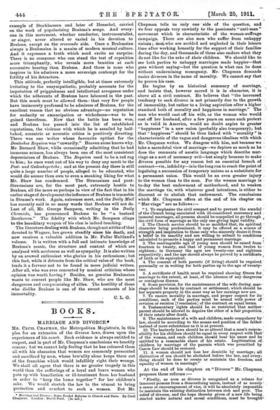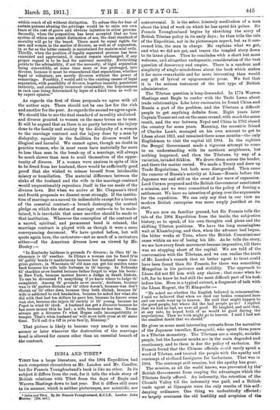BOOKS
MARRIAGE AND DIVORCE..
Mu. CECIL CHAPMAN, the Metropolitan Magistrate, in this plea for an eitension of the divorce laws, draws upon the experiences of his court. Such evidence is always entitled to respect, and in part of Mr. Chapman's conclusions we heartily concur; but we cannot help feeling that he has coloured them all with his obsession that women are commonly persecuted and sacrificed by men, whose brutality alone keeps them out of the franchise which would infallibly right their wrongs. We shall all agree that 'there is no greater tragedy in this world than the sufferings of a loyal and brave woman who puts up with humiliation or ill-treatment from her husband in order to "keep the home together" for her children's sakb. We would stretch the law to the utmost to bring protection and ccmfort to such a woman. But Mr.
. • Marriage and DiVOTC8 Seine Needed Reforms in Chirch and State.- By Cecil Chapman. London ; David Nutt. Ds. net.]
Chapman tells us Only one side of 'the question, and we fear appeals very unwisely to the passionate 't anti-man" movement which is characteristic of the woman-suffrage
campaign. There are also men 'who suffer from unhappy unions ;._mew who are scolded and neglected in their leisure time after working honestly for.the support of iheir families during the day, and thousands of these also endure what they do not like for the sake of .their children. We should like to see both parties to unhappy marriages made happier—that goes without saying—but the question is what can be done without undermining monogamy. Mr. Chapman demands easier divorces in the name of morality. We cannot say that
he proves his case.
He begins by an historical summary of marriage, and insists that, however sacred it is in character, it is above all a civil contract. He believes that "the increased :- tendency to seek divorce is not primarily due to the growth 1- of immorality, but rather to a living aspiration after a higher 1,
standard both of morality and happiness in marriage." The man who would cast off his wife, or the woman who would. cast off her husband, after a few years on some such pretext as is valid in America, 'would no doubt aspire to greater " happiness " in a new union (probably also temporary); but that " happiness " should be thus linked with " morality" is characteristic of the vague and dangerous idealism with which _ Mr. Chapman writes. We disagree with him, not because We take a sacerdotal view of marriage—we deplore as much as he - does the remnants -of ascetic language which describe mar- riage as a sort of necessary evil—but simply because to make divorce possible for any reason but an essential breach of ' contract—viz., infidelity—is in the long.run to reach the point of legalising a succession of -temporary unions as a substitute for a. permanent union. This would be an even greater injury to the woman than to the man. For the woman marriage is to-day the best endowment of motherhood, and to weaken the marriage tie, with whatever good intentions, is either to discount or to abolish that endowment. The conclusions which Mr. Chapman offers at the end of his chapter on.- " Mar-riage " are as follows :— "1. To emphasise the civil compact and to prevent the scandal of the Church being associated with ill-considered mercenary and immoral marriages, all persons should, be compelled to go through the civil form of marriage as the only one giving legal validity. 2. The Church service should be so modified that, its spiritual character being predominant, it may be- offered as a source of strength and inspiration to those only_who sincerely desire it from a belief in its sanctity and are willing to submit to conditions
calculated to promote a happy and permanent marriage. ' 3. The marriageable age of young men should be raised from - fourteen to twenty, and that of young women from twelve to eighteen ; in Germany the ages are twenty-one and eighteen respectively ; and the age should always be proved by a certificate of birth or its equivalent. 4. The consent of both parents (if living) should be required personally- or in writing for both parties up to the age of twenty- one.
5. A certificate of health must be required showing fitness 'for marriage to the extent, at least, of the absence of any dangerous or contagious disease. 6. Some provision for the maintenance of the wife during mar - riage should be made by contract or settlement, which should be , her separate property in the same way as her earnings now are.
7. To ensure morality in marriage, and proper respect for its - conditions, each of the parties must be armed 'with power of revision or recision [P rescission] of the contract on equal terms. 8. Testamentary rights should be so restricted that neither-, parent should be allowed to deprive the other of a fair proportion ,. of their estate after death.
9. The maintenance of a wife and children, made compulsory by - law, should be according to the means and position of the father instead of mere subsistence as it is at present.
10. The bastardy laws should be so altered that a man's respOn- sibility for his children should be equal in every respect with that' of the woman, and such children should bear his' name and be entitled to a reasonable share of his estate. Legitimation of children by marriage of the parents which was permitted by
Canon taw should be restored. .
11. A woman should not lose her domicile by marriage ; all distinction of sex should be abolished before the law, and every- thing should be done to create or maintain the freedom. and
equality of women in marriage." -
At' the end' of his chapters on "Divorce " Mr. Chapman_ proposes these reforms :—
"Firstly, as soon as' divorce is recognised as a release fort innocent' persons from a demoralising union, instead of as merely: a cause or encouragement of vice, it will be absolutely impossible; to maintain the existing distinction between rich and poor. The- relief of divorce; and the -hope -thereby given of a new life being: started under natural and moral conditions, must be' bronghf- within reach of all without distinction. To refuse this for fear of certain-persons abusing the privilege would be to calm our own fears at the cost of grave and obvious injustice to other persons. Secondly, when the preposition has been accepted that no true system :of ethics can admit distinction of sex, the dual standard of morality will go by the board. There must be equal rights for mien and women in the matter of divorce, as well as of separation, in so far as the latter remedy is maintained for matrimonial evils. Thirdly, when the position of legally separated persons has been examined and appreciated, it cannot remain unchanged, if any proper. regard is to be had for national morality. ,Everything points to the advisability, if not the necessity, of legal separation being convertible, at some time more or less prolonged, into divorce, because it must be remembered that separations; whether legal or voluntary, are merely divorces without the power of remarriage. Fourthly, I would add to the existing causes of legal separation, with possibility of divorce, hopeless insanity, persistent inebriety, and constantly recurrent criminality, the hopelessness in each case being determined by lapse of a fixed term as well as by expert opinion."
As regards the first of these proposals we agree with all the author says. There should not be one law for the rich and another for the poor. As regards the second we agree again. We should like to seethe dual standard of morality abolished and divorce granted to women on the same terms as to men. It will be argued that as there is no parity between the injury done to the family and society by the disloyalty of a woman to the marriage contract and the injury done by a man by disloyalty, equality in the facilities for divorce would be illogical and harmful. We cannot agree, though no doubt in practice women, who in most cases have materially far more to lose than men in the break-up of a marriage, will always be much slower than men to avail themselves of the oppor-. tunity of divorce. If a woman were anxious in spite of this to be freed from her husband, there would be sufficiently good proof that she wished to release herself from intolerable :misery or humiliation. The material difference between the stake of the husband and the wife in the marriage contract would unquestionably reproduce itself in the use made of the divorce laws. But when we arrive at Mr. Chapman's third and fourth proposals we dissent most strongly. If the institu- tion of marriage as a sacred tie indissoluble except for a breach of the essential contract—a breach destroying the mutual pledge on which the status of marriage rests—is to be main- tained, it Is inevitable that some sacrifice should be made to that institution. Wherever the conception of the contract of a sacred, spiritual, and permanent bond is relaxed, the marriage contract is played with as though it were a mere conveyancing document. We have quoted before, but will quote again here, the caricature—not so much of a caricature either—of the American divorce laws as viewed by Mr. Dooley :— "In Kentucky baldness is grounds f'r divorce ; in Ohio th' in- clemency iv th' weather. In Illinye a woman can be freed fr'm th' gallin' bonds iv mathrimony because her husband wears Con- gress gaiters ; in Wisconsin th' old man can get his maiden name back because his wife tells fortunes in th' taycup. In Nebrasky th' shackles ar-re busted because father forgot to wipe his boots : in New York, because mother knows a Judge in South Dakota. Ye can be divoorced f'r anything if ye know where to lodge th' complaint. Among th' grounds ar-re snorin', deefness, because wan iv th' parties dhrinks an' th' other doesn't, because wan don't dhrink an' th' other dees, because they both dhrink, because th' wife is addicted to sick headaches, because he asked her what she
did with that last ten dollars he gave her, because he knows some wan else, because she injyes th' society iv th' young, because he
frgot to wind th' dock. A husband can get a divoorce because he has more money thin he had ; a wife, because he has less. Yeean always get a divoorce f'r what Hogan calls incompatibility iv temper. That's whin husband an' wife ar-re both cross at th' same time. Ye'd call it a tiff in ye'er family, Hinnissy."
That picture is likely to become very nearly a true one sooner or later wherever the destruction of the marriage bond is allowed for causes other than an essential branch of
the contract.











































 Previous page
Previous page